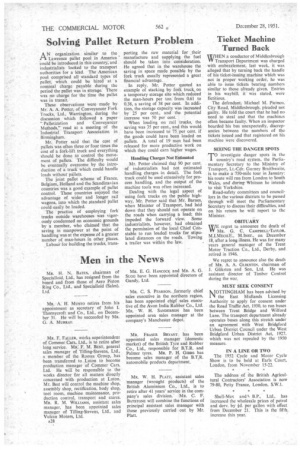Solving Pallet Return Problem
Page 30

If you've noticed an error in this article please click here to report it so we can fix it.
A N organization similar to the Lawrence pallet pool in America • could be introduced in this country, and industrialists looked to the transport authorities for a lead. The American pool comprised all standard types of pallet, which could be hired at a nominal charge payable during the period the pallet was in storage. There was no charge for the time the pallet was in transit.
These observations were made by Mr. A. A. Potter, of Conveyancer Fork Trucks, Ltd., Warrington, during the discussion which followed a paper " Palletization and Conveyancer Methods," read at a meeting of the Industrial Transport Association in Birmingham.
Mr. Potter said that the cost of pallets was often three or four times the cost of a fork-lift truck and everything should be done to control the movement of pallets. The difficulty would be eventually overcome by the introduction of a truck which could handle loads without pallets.
The joint pallet scheme of France, Belgium, Holland and the Scandinavian countries was a good example of pallet control. These countries enjoyed the advantage of wider and longer rail wagons, into which the standard pallet could easily be loaded. The practice of employing fork trucks outside warehouses was vigorously condemned on economic grounds by a member, who claimed that the saving in manpower at the point of handling was at the expense of a greater number of man-hours in other places, .Labour for building the trucks, trans porting the raw material for their manufacture and supplying the fuel should be taken into consideration. He agreed that in the warehouse the saving in space made possible by the fork truck usually represented a great financial advantage.
In reply, Mr. Potter quoted an example of stacking by fork truck, on a temporary storage site which reduced the man-hours per ton from 0.61 to 0.38, a saving of 38 per cent. In addition, the storage capacity was increased by 25 per cent., and the potential increase was 50 per cent.
When loading on rail trucks, the saving was 35 per cent., and this would have been increased to 75 per cent, if the goods could have been loaded on pallets. A total of 19 men had been released for more productive work on which they could earn higher wages.
Handling Charges Not Estimated Mr. Potter claimed that 90 per cent. of industrialists had not estimated handling charges in detail. The fork truck could be used extensively for process handling, and the output of the machine tools was often increased, Dealing with the legal aspect of using fork trucks on the public highway, Mr. Potter said that Mr. Barnes, when Minister of Transport, had laid down that they should not operate on the roads when carrying a load; this impeded the forward view. Some Andustrialists, however, had obtained the permission of the local Chief Constable to run loaded trucks for stipulated distances on the roads. Towing a trailer was within the law.












































































